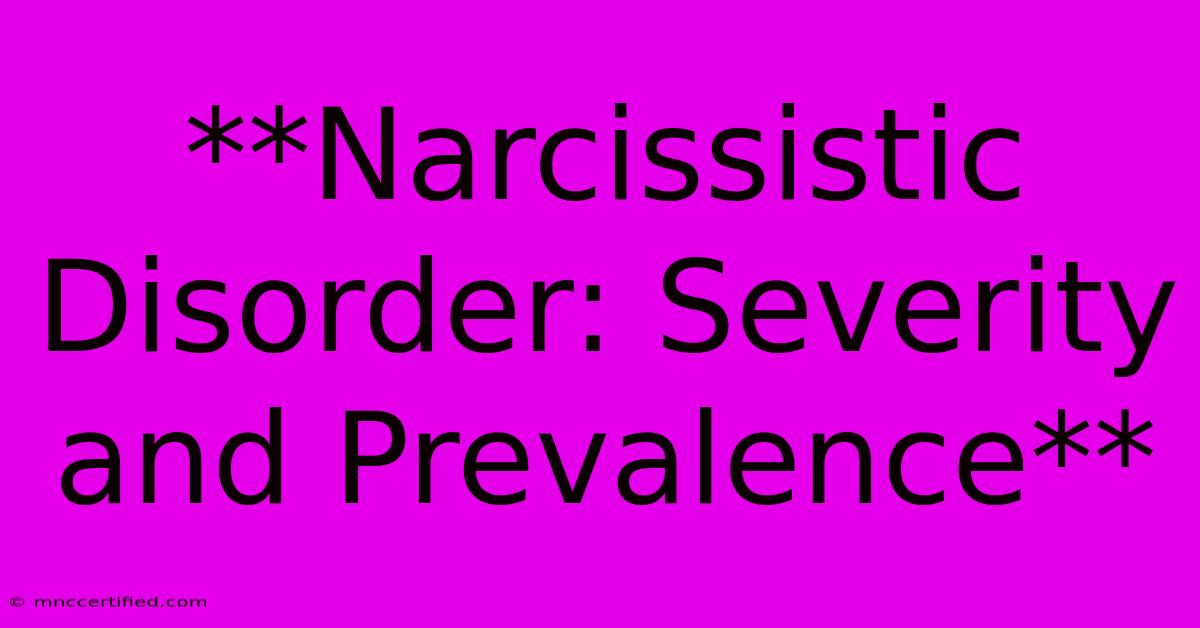**Narcissistic Disorder: Severity And Prevalence**

Table of Contents
Narcissistic Disorder: Severity and Prevalence
Narcissistic personality disorder (NPD) is a mental health condition characterized by an inflated sense of self-importance, a deep need for admiration, and a lack of empathy for others. While it's a common topic of conversation, understanding the severity and prevalence of NPD is crucial to both recognizing and addressing it effectively.
Defining the Spectrum of NPD
NPD isn't a one-size-fits-all diagnosis. Individuals experience the disorder with varying degrees of severity. Some may display milder traits, while others exhibit more pronounced and disruptive behaviors. The severity of NPD can significantly impact an individual's relationships, work life, and overall well-being.
Here are some key factors that contribute to the spectrum of NPD severity:
- The number and intensity of narcissistic traits: The more narcissistic traits an individual exhibits, and the more intense these traits are, the more severe their NPD is likely to be.
- The degree of impairment: How much does NPD interfere with an individual's daily life, relationships, and work? The more severe the impairment, the more severe the NPD.
- Comorbid conditions: People with NPD often have other mental health conditions, such as anxiety, depression, or substance abuse. These conditions can exacerbate the severity of NPD.
Prevalence of NPD
While NPD is a commonly discussed topic, accurately determining its prevalence is a challenge. Studies have shown that approximately 0.5% to 1% of the general population meets the criteria for NPD. However, this number is likely an underestimate due to several factors:
- Underreporting: Many individuals with NPD don't seek help or disclose their condition, leading to underreporting in studies.
- Misdiagnosis: NPD can be difficult to diagnose, and it's often misdiagnosed as other conditions, such as borderline personality disorder or histrionic personality disorder.
- Subclinical narcissism: Many people exhibit some narcissistic traits but don't meet the full criteria for NPD. These individuals may not be included in prevalence studies.
Despite the difficulty in pinpointing exact numbers, research suggests that NPD is more prevalent in:
- Men: Studies have found that NPD is more common in men than in women.
- Young adults: The onset of NPD is typically in early adulthood, and the condition may be more prevalent in this age group.
- Individuals with a family history of NPD: There is some evidence to suggest that NPD may be hereditary.
The Impact of NPD
Understanding the severity and prevalence of NPD is essential for several reasons:
- Early identification and intervention: Early identification and treatment can significantly improve the quality of life for individuals with NPD and those around them.
- Reducing stigma: Raising awareness about NPD and its diverse manifestations can help reduce stigma associated with the condition.
- Developing effective treatment strategies: Research into the various forms of NPD can lead to more effective treatment strategies tailored to individual needs.
Individuals with NPD can benefit from therapy, such as cognitive-behavioral therapy (CBT), to help them:
- Develop empathy and compassion for others.
- Challenge negative thoughts and beliefs.
- Build healthier relationships.
Moving Forward
Narcissistic personality disorder is a complex mental health condition that requires careful consideration. By understanding its severity, prevalence, and impact, we can work towards better recognizing, addressing, and ultimately supporting individuals with NPD.

Thank you for visiting our website wich cover about **Narcissistic Disorder: Severity And Prevalence**. We hope the information provided has been useful to you. Feel free to contact us if you have any questions or need further assistance. See you next time and dont miss to bookmark.
Featured Posts
-
Chinas Singles Day Growth Slows Down
Nov 12, 2024
-
Stefanik Selected As Trumps Un Ambassador
Nov 12, 2024
-
Welby Resignation Demanded Over Serial Abuse Case
Nov 12, 2024
-
Investment Policy Statement Software
Nov 12, 2024
-
Manchester Lights Up For Mtv Emas 30th
Nov 12, 2024